 Washington/Geneva, December 9, 2015. The U.N. Committee against Torture has condemned China’s record of maltreatment in an unusually long and detailed report that raises serious questions about the way the Chinese Party state operates.
Washington/Geneva, December 9, 2015. The U.N. Committee against Torture has condemned China’s record of maltreatment in an unusually long and detailed report that raises serious questions about the way the Chinese Party state operates.
The Committee published its Concluding Observations today following an examination of China’s record on torture in November at the U.N. in Geneva.[1]
Kai Mueller, Executive Director of ICT Germany, said: “The 16 page document signals the Committee’s profound concern about abuses in the PRC, and its commitment to hold the Chinese authorities to account for the suffering endured by those who bore witness to the Committee. It also reflects alarm at China’s attempts to subvert criticism of its record on human rights and to distort the reality – for instance when PRC officials told the Committee that ‘tiger chairs’ used for immobilization and torture are made ‘comfortable’ for the victims, using soft cushions.”
The U.N. Committee did not only criticize the practice of torture and ill-treatment in China, but also tackled the entire PRC system, referring in particular to the lack of independence of the Chinese judiciary and the influence of the CCP as a fundamental failing. It said that it remained “seriously concerned over consistent reports indicating that the practice of torture and ill-treatment is still deeply entrenched in the criminal justice system“, and criticized the lack of independent investigation into torture.
In particular, the Committee expressed concern about deaths in custody, such as the case of the prominent and highly respected Tibetan lama Tenzin Delek Rinpoche who was being held on trumped-up charges and died at a high-security remote prison in July. Kai Mueller said: “Despite the multitude of credible reports on cases of torture of Tibetans and even despite the open misconduct of the authorities in such cases as of Tenzin Delek Rinpoche, the Chinese government flatly denies that the problem even exists. This is utterly unacceptable. China’s actions indicate a very deliberate flouting of any respect for rule of law and due process that has arguably worsened since it last faced a review by the Convention Against Torture in 2008.”
The Committee urged that all instances of death in custody, allegations of torture and ill-treatment and refusal to provide medical treatment are promptly and impartially investigated by an independent body other than the procuratorial authorities, and that those found responsible for deaths in custody that result from torture, ill-treatment or denial of medical treatment are brought to justice and, on conviction, adequately punished. Detained persons must have access to adequate medical care, including to a doctor of their choice.
From a list of 26 Tibetans indicated for reply in a “List of Issues” by the Committee, 24 cases remain unanswered. Furthermore, in a strongly worded reminder to the Chinese government, the Committee “recalls the absolute prohibition of torture contained in article 2, paragraph 2, of the Convention: “No exceptional circumstances whatsoever, whether […] internal political instability or any other public emergency, may be invoked as a justification of torture”. The Committee also draws the State party’s attention to its general comment No. 2 (2007), in which it mentions that State parties must ensure that the laws in practice are applied to all persons, regardless of the ethnicity or reason for which the person is detained, including persons accused of political offences. The Committee urges the State party to provide the requested information on all Tibetan cases mentioned in (…) the list of issues. It also urges the State party to ensure that all custodial deaths, disappearances, allegations of torture and ill-treatment, and reported use of excessive force against persons in the Tibetan Autonomous Region and neighboring Tibetan prefectures and counties, (…), are promptly, impartially and effectively investigated by an independent mechanism.
The Concluding Observations by the Committee against Torture can be downloaded here.
The International Campaign for Tibet submitted a report on torture in Tibet to the Committee in October.[2] In February, ICT had published a report that highlights the cases of 29 Tibetans, detailing evidence that these Tibetans had suffered from torture and ill-treatment. The report documents 14 cases of Tibetans who have died in prison or immediately after their release.[3]
Footnotes
[1] International Campaign for Tibet, November 18: “Torture widespread and endemic in Tibet – China must end torture in Tibet” – Replies by China not acceptable; http://www.savetibet.org/un-committee-against-torture-underlines-urgency-of-situation-in-tibet/;
[2] International Campaign for Tibet, October 26, 2015: “Civil society submission for the 5th cycle of the United Nations Committee against Torture, review of the People’s Republic of China”, http://www.savetibet.org/icts-submission-to-un-committee-against-torture-on-chinas-action-in-tibet/;
[3] International Campaign for Tibet, February 26, 2015: “Torture and Impunity – 29 Cases of Tibetan Political Prisoners”, http://www.savetibet.org/torture-and-impunity-29-cases-of-tibetan-political-prisoners/.